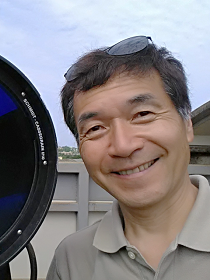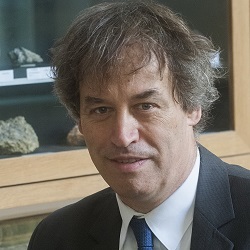JpGU 2021 - Joint Sessions
JpGU-AGU joint session
コンビーナ

Vincent TONG

Hidenori NAKAMURA

Mika SHIMIZU

Fumiko NOGUCHI
Advancing SDGs through inclusive partnerships I: Strategic leadership
With interconnected objectives and impact across natural, social and human sciences, partnerships between academics, students, citizens, industry, businesses and other stakeholders are critical to the success of SDGs-aligned initiatives. How equity, diversity and inclusion (EDI) are valued and embedded in these partnerships warrants reflection and critical examination - for empowering and benefiting all stakeholders. In this session, we examine the diverse forms of partnerships in the design, implementation and impact of SDGs initiatives.
JpGU-AGU joint session
コンビーナ

Michiyo SHIMAMURA

Brooks HANSON

Yasuhiro YAMANAKA

Kiyoshi SUYEHIRO
What is the true value of Knowledge Creation? The Ideal and Reality of Research Evaluation.
There is a wide range of research, from "research that responds to the obligations of society" to "research that responds to the intellectual curiosity of humankind," but in recent years, the recognition and imperative that the scientific community needs to contribute more to helping societal challenges has been growing and that the research culture should be adjusted to support this. How are the research community, it’s culture, and funding agencies adjusting for these "social mandates"?
In this session, we invite the members of the geoscience research community to discuss "the connection between ideal science and our own community and society", and would like to promote mutual understanding of the need to expand equity and diversity. Also, we would like to consider together about how researchers themselves can evaluate their research activities and create a culture that fulfills their accountability to society. To that end, it will consist of discussions by panelists based on reports of overseas cases and questionnaires.
In this session, we invite the members of the geoscience research community to discuss "the connection between ideal science and our own community and society", and would like to promote mutual understanding of the need to expand equity and diversity. Also, we would like to consider together about how researchers themselves can evaluate their research activities and create a culture that fulfills their accountability to society. To that end, it will consist of discussions by panelists based on reports of overseas cases and questionnaires.
JpGU-EGU joint session
コンビーナ

Naoshi HIRATA

Keiko TAMURA

Matthew GERSTENBERGER

Danijel SCHORLEMMER
From Hazard to Resilience
Natural hazards continue to be an increasing challenge to societies around the world, with many societies impacted by multiple types of hazard events. To reduce the impact of these hazards we must not only quantify the hazard and risk associated with multi-hazard events, but we must also understand the uncertainty associated with these events (e.g., ISO 31000 defines risk as the effect of uncertainty on objectives). Resilience can only be improved by
considering all these factors. Multi-hazard and risk modeling approaches are receiving increasing attention globally, however, the challenges of assessing uncertainty in both single- and multi-hazard risks are considerable. Without a clear understanding of the risks and their uncertainties, measures to mitigate these risks and to increase resilience face difficult decisions: What is the confidence in the hazard and risk information provided? How can the
stakeholder make well-informed decisions? What measures will increase resilience and how can this be quantified? How can event response be planned in an effective way?
In this session we aim to discuss new developments occurring at the confluence of hazard and risk assessment, and their uptake into society. This includes investigations into fundamental hazard/risk modeling, methods for their use in decision making, and experiences and understanding in their communication. We solicit presentations on a wide range of topics related to questions such as: What are the latest developments in single- and multi- hazard and risk models? What uncertainties are the most critical for decision making? How can they be identified, quantified and reduced? How can hazards, risks and their uncertainties be communicated to the public and stakeholders in a comprehensible, trustworthy and actionable way? Can artificial intelligence and machine learning fill the uncertainty gap? What is the role of smart cities in helping mitigate risks? What are recent experiences in bringing hazard and risk information into policy and decision making?
In this session we aim to discuss new developments occurring at the confluence of hazard and risk assessment, and their uptake into society. This includes investigations into fundamental hazard/risk modeling, methods for their use in decision making, and experiences and understanding in their communication. We solicit presentations on a wide range of topics related to questions such as: What are the latest developments in single- and multi- hazard and risk models? What uncertainties are the most critical for decision making? How can they be identified, quantified and reduced? How can hazards, risks and their uncertainties be communicated to the public and stakeholders in a comprehensible, trustworthy and actionable way? Can artificial intelligence and machine learning fill the uncertainty gap? What is the role of smart cities in helping mitigate risks? What are recent experiences in bringing hazard and risk information into policy and decision making?
JpGU-AGU joint session
JpGU-EGU joint session
日本地球惑星科学連合2021年大会
P-PS02
コンビーナ

Takehiko SATOH

Thomas WIDEMANN

Kevin MCGOULDRICK

Hideo SAGAWA
Recent advances of Venus science and coming decades
This joint session welcomes abstracts all about Venus sciences as well as the methodologies of observations, data processings, retrievals, plus theories and numerical simulations. We also value astrobiological aspects and implications to exoplanets.
The session is being convened by a group of people from Japan, Europe (the region of EGU), and USA (the country of AGU). This reflects the international relay of Venus explorations in this century: Venus Express (ended), and Akatsuki (on-going), hopefully followed by EnVision, VERITAS, and DAVINCI.
We are, of course, not to forget about Russian Venera-D and Indian Shukrayaan-1 missions. It's going to be a golden age of Venus again!
Get together, and get excited by all latest results and activities in this expanding community!
The session is being convened by a group of people from Japan, Europe (the region of EGU), and USA (the country of AGU). This reflects the international relay of Venus explorations in this century: Venus Express (ended), and Akatsuki (on-going), hopefully followed by EnVision, VERITAS, and DAVINCI.
We are, of course, not to forget about Russian Venera-D and Indian Shukrayaan-1 missions. It's going to be a golden age of Venus again!
Get together, and get excited by all latest results and activities in this expanding community!
JpGU-AGU joint session
JpGU-EGU joint session
日本地球惑星科学連合2021年大会
A-OS09
コンビーナ

Yushi MORIOKA

Hiroyuki MURAKAMI

Masuo NAKANO

V RAMASWAMY
Climate variability and predictability on subseasonal to multidecadal timescales
Climate variability on subseasonal-multidecadal timescales (e.g. Madden-Julian Oscillation, ENSO, Indian Ocean Dipole, Pacific Decadal Variability, Atlantic Multidecadal Variability) has serious impacts on global and regional socioeconomic activities through changes in intensity and frequency of extreme weather events (e.g. cold/heat waves, tropical storms, and floods/droughts). Efforts have been made to understand and predict subseasonal-multidecadal climate variability, but climate simulations and predictions using state-of-the-art coupled general circulation models have biases that represent large uncertainties in amplitude and spatial patterns of the climate variability. The model uncertainties arise from multiple factors such as inadequate understanding of weather and climate interactions across different spatiotemporal scales (e.g. tropical cyclones-ENSO) and insufficient representation of the complex and non-linear climate system (e.g. troposphere-stratosphere coupling, atmosphere-ocean-sea ice-land interactions). Recently, Coupled Model Intercomparison Project Phase 6 (CMIP6) has opened up new model simulation datasets to the public, which can be expected to further advance our understanding and prediction of subseasonal-multidecadal climate variability under the changing climate.
This session invites all research related to the subseasonal-multidecadal climate variability and predictability using observational, theoretical, modelling and AI/ML frameworks and especially novel approaches.
This session invites all research related to the subseasonal-multidecadal climate variability and predictability using observational, theoretical, modelling and AI/ML frameworks and especially novel approaches.
JpGU-AGU joint session
日本地球惑星科学連合2021年大会
A-HW22
コンビーナ

Morihiro MAEDA

Tomohisa IRINO

Shin-ichi ONODERA

Adina PAYTAN
Material transportation and cycling in watershed ecosystems; from headwaters to coastal areas
This session aims to synthetize watershed sciences in order to understand dynamic processes in transportation and cycling of materials and nutrients in watershed ecosystems from headwaters to coastal areas. The session will integrate research in various inter-disciplinary fields including limnology, ground water hydrology, coastal oceanography, meteorology, soil science, sedimentology, forestry, agriculture, fishery, ecology, social science and more. This session calls for ideas on new methods for understanding watershed ecosystems, such as tracers and molecular techniques, hydrological modeling, paleontological approaches, and chemical analyses, in order to elucidate physical, chemical and biological mechanisms for shedding light on natural phenomena and their spatio-temporal variations in complex and dynamic aquatic systems under human and climate impacts. Laboratory and field studies as well as social-scientific evaluation of ecosystem services and social-ecological systems are welcomed. Through this session, we would like to facilitate interdisciplinary collaboration among participant that will foster new knowledge on watershed sciences.
JpGU-AGU joint session
コンビーナ

Eiji OHTANI

Saeko KITA

Michihiko NAKAMURA

Bjorn MYSEN
MAGMA, FLUID TRANSPORT, AND SEISMICITY IN THE EARTH'S INTERIOR
The proposed session will discuss the degree of hydration and dehydration in the slab and mass transfer process in the deep earth’s interior based on contributions from a wide variety of scientific disciplines including laboratory experiments, numerical modeling, and geophysical and geochemical observations.
JpGU-AGU joint session
日本地球惑星科学連合2021年大会
S-GC32
コンビーナ

Takeshi HANYU

Gray E. BEBOUT

Yuji SANO

Hirochika SUMINO
Volatiles in the Earth - from Surface to Deep Mantle
We welcome presentation of results from experimental, observational, and modeling studies that help shed light on the behavior, chemical/physical characteristics, and fluxes/budgets of volatiles such as hydrogen, carbon, nitrogen, noble gases, halogens, and sulfur, and the roles of these volatiles in Earth processes.
JpGU-AGU joint session
JpGU-EGU joint session
コンビーナ

Jyh-Jaan Steven HUANG

Atsuko AMANO

Masafumi MURAYAMA

Ludvig A. LÖWEMARK
Developments and applications of XRF-core scanning techniques in natural archives
X-ray fluorescence (XRF) core scanning techniques have revolutionized element proxy-based paleo-researches over the last decade and now becomes an indispensable tool for many research area. However, despite being fast, non-destructive, and providing records of elemental variations at the submillimeter resolution, science applications of XRF-core scanning results also encounter numerous challenges due to its intrinsically semi-quantitative and ultra-high resolution nature, such as the influences of down-core physical and organic variations, parameter optimizations of machinery, as well as quantitative calibrations and evaluations of the voluminous and complex scanning data. Therefore, the implications of shifts and trends in the elemental data remain challenging to interpret in many settings. It is therefore considered timely to bring together international specialists using high-resolution XRF-core scanners in all fields of science to present new research, to stimulate new collaborations and discussions, as well as to propose new technological developments.
JpGU-EGU joint session
コンビーナ

Luigi GERMINARIO

Chiaki T. OGUCHI

Ákos TÖRÖK

Tetsuya WARAGAI
Weathering and conservation of cultural heritage and geosites
This session discusses multidisciplinary applications to the study of geological materials in cultural and natural contexts, their decay and protection.
JpGU-AGU joint session
JpGU-EGU joint session
日本地球惑星科学連合2021年大会
M-GI31
コンビーナ

Baptiste CECCONI

Yasuhiro MURAYAMA

Yasuhisa KONDO

Shelley STALL
Open and FAIR Science: Data Sharing, e-Infrastructure, Data Citation and Reproducibility
Open Science is widely accepted as a new research paradigm to accelerate scientific innovation. It commonly refers to the top-down policies making results of publicly-funded research freely available and accessible. Open Science also refers to community-supported bottom-up approaches such as citizen science, crowdfunding, and interdisciplinary research. Other stakeholders (research institutions, funding agencies, scientific editors, etc) are also fostering open science using tools like data management plans, data citation and the use of persistent identifiers. All these approaches envision the transformation of research process to meet to the FAIR (Findable, Accessible, Interoperable, and Reusable) principles.
Following the past sessions at the JpGU and AGU Fall Meetings since 2018, this session reviews the current broad spectrum of Open Science in international contexts. The session welcomes a wide range of papers and posters covering (but not limited to) open research data, open source licenses, data papers and journals, data repository, e-infrastructures and platforms for sharing data, scientific cloud infrastructures, FAIR principles, Persistent Identifiers (PID), data management, citizen science, crowdsourcing, crowdfunding, transdisciplinary research, capacity building, international networking, and deployment in earth and planetary sciences.
Following the past sessions at the JpGU and AGU Fall Meetings since 2018, this session reviews the current broad spectrum of Open Science in international contexts. The session welcomes a wide range of papers and posters covering (but not limited to) open research data, open source licenses, data papers and journals, data repository, e-infrastructures and platforms for sharing data, scientific cloud infrastructures, FAIR principles, Persistent Identifiers (PID), data management, citizen science, crowdsourcing, crowdfunding, transdisciplinary research, capacity building, international networking, and deployment in earth and planetary sciences.
JpGU-EGU joint session
コンビーナ

Yuichi S. HAYAKAWA

Christopher A. GOMEZ

Shigekazu KUSUMOTO
GEOSCIENTIFIC APPLICATIONS OF HIGH-DEFINITION TOPOGRAPHY AND GEOPHYSICAL DATA IN THE ANTHROPOCENE
Welcome to our session on the high-definition topography and geophysical data in the Anthropocene. We are open to various applications of high-definition data on the Earth surface. From civil engineering, forestry to micro-landscape and planetary data, point-cloud data have revolutionized data collection, processing and the way we think of the surfaces we live on explore. Come and be part of this revolution and share your own experience in a friendly environment.